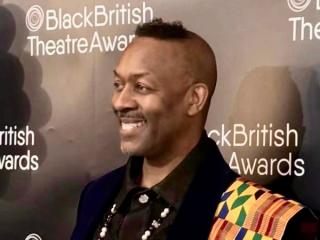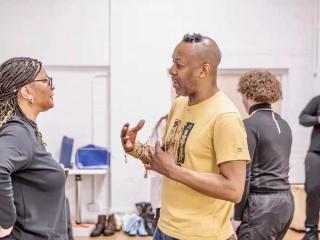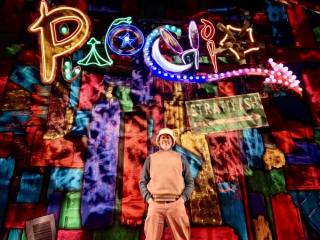“Be Kind. Be You.” — A Conversation with Omar Okai
Omar F. Okai is a director, choreographer, and educator from London, UK. He is also the co-founder and co-director of the Black British Theatre Awards (BBTAs), and has served as associate director for the West End musical Get Up, Stand Up!, as well as reimagining well-known works like Kinky Boots in concert form.
On 1st May 2025, in collaboration with Beijing Dahua Performing Arts Centre, we invited Omar Okai and Ivy Pan — the lead actress of the Chinese production of The Phantom of the Opera — to lead a four-day musical theatre workshop. During the live-streamed event, we were honoured to conduct an in-depth interview with Omar. With sincerity and humility, he shared the insights and reflections gained over his decades-long journey in theatre — offering wisdom that left a lasting impression.

“Please remember, we’re auditioning you because we want to see you.”
“People get nervous about auditions, but I always remind actors: we're not paying you to be here — there's no need to feel pressured.” Omar admits that as a director, he does his best to help performers feel relaxed and comfortable. “I genuinely thank you for your time, and I want you to show us who you really are. After going through your CV and self-tapes, we now want to meet you.”
For roles in existing productions, he also urges performers to do their research: “It’s not about who sings or dances best — it’s about whether you fit the role. What can you bring to the cast? What spark can you offer this show?”
His advice is clear: “Fuse yourself with the character. Show us your uniqueness.”
“Being a kind person is more important than anything.”
When asked what he expects of performers, Omar’s message is simple: “Be kind.” In theatre, whether you're the lead or part of the ensemble, everyone plays a vital role. “Every costume you wear, every light that hits you — there's a team of people behind it. The audience is here to see the whole show, not just you. The star of the show is the show itself.”
To him, being a performer isn't some noble, life-altering profession — not like being a doctor or a police officer. “And precisely because of that, we should remain humble. Being able to do what you love and receive applause for it is already a privilege.”
At the same time, he gently reminds performers to also be kind to themselves.
“Mistakes in rehearsal are good — they help you grow. Be brave enough to try something new; the choreographer or director might just love it!”
“And if you make a mistake on stage and get scolded for it, please remember — that was the character’s mistake, not yours.”
Theatre requires sacrifices: no weekends, no holidays — rehearsals and performances consume your life. “But that’s because we love this world. And the reason theatre exists, is because no other feeling can replace that moment when your heart races before the curtain rises.”

“Theatre must be joyful.”
Speaking about his teaching philosophy, Omar shares a story he often tells.
“Once, I was directing Assassins at Mountview. One student stood out — not because he was the best, but because he always listened and tried his hardest to apply my notes. I told him, ‘I’d love to work with you one day.’ Years later, when I was working for Disney, he was cast as well. At the final dress rehearsal, he cried and told me everything I said had come true.”
Disney’s CEO, Michael Eisner, happened to be there and said to Omar: “Not every teacher treats their students with such sincerity.”
To Omar, a teacher’s role isn’t about proving who’s better. “Of course I’m more experienced — that’s why I’m here to share. But that’s just for now. The ones who last in this industry are the ones who keep learning and improving.”
What he cares most about is simple: “Did you have fun?”
“Only when people feel joy do they truly want to sing and dance.” That’s why his classes are always full of energy. “I want people to let go of pressure, to be bold in their choices, and to not be afraid of mistakes.”
He also acknowledges that everyone is different — some are outgoing, some are shy; some like to prepare in advance, while others thrive on improvisation. “There’s no right or wrong in that. Don’t blame yourself.”
“Remember — you’re playing a character. It’s not you.”
Omar shared a unique exercise he gives to actors: “I ask them to analyse which lines in the script are said while wearing a ‘mask’ — meaning, which ones are not entirely sincere.”
“We often assume that characters always speak the truth, but just like in real life, people lie and conceal things. So do characters. This kind of analysis brings depth.”
He also warns against being obsessed with perfection. “Some people audition or rehearse just to prove they’re good. But remember — the one on stage is the character, not you. Find your connection to them, then pause, observe, listen, and respond. That’s what acting truly is.”
And when performing emotionally heavy or sensitive work, he offers a gentle reminder: “After the curtain call, let the character go. Protect yourself. Your life matters more than any role.”

“The birth of a show is a string of miracles.”
“To get a musical to the West End, it has to go through so much — demo recordings, table readings, workshops, finding producers, starting in smaller theatres…” Omar laughs. “If any part of the process fails, the show might never happen. So all those famous shows you know? They’re all miracles.”
As for what defines a “successful” musical, he breaks it into two parts: commercial and artistic.
“Commercially, a show needs to run at least two or three years to break even. But artistically, success has nothing to do with scale — a tiny fringe show can still receive critical acclaim if the script and score are strong.”
He gives the example of Honk! composer George Stiles. “He started in fringe theatre and ended up beating The Lion King to win the Olivier Award.” A few years later, he saw a performance of Six at the Edinburgh Fringe and decided to back it as a producer, helping bring it to global stages.

Omar Okai’s words — like his work — are powerful, tender, and honest. With the perspective of a seasoned theatre veteran, he sees the highs and lows of this career path clearly, yet continues to choose warmth, humour, and generosity toward every performer he meets. He reminds us: “While chasing your dreams, remember to be kind — to others, and to yourself.”
In rehearsals and classrooms, Omar isn’t the kind of teacher who lectures from a pedestal. He’s the one in the room, sweating alongside everyone else. With every breath, he shows us: theatre isn’t about being seen — it’s about making a connection.
This interview wasn’t just a conversation. It felt like a profound lesson in theatre and life. We didn’t just hear his stories — we stepped into rehearsal rooms with him, heard him encouraging students, and saw the love for theatre burning in his eyes. Humble, honest, passionate — perhaps this is what makes a true artist truly beautiful.



